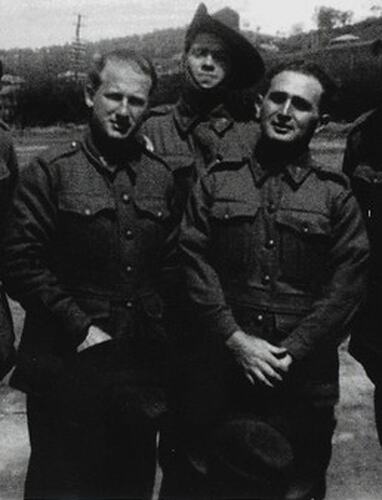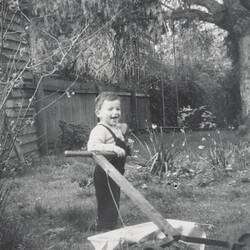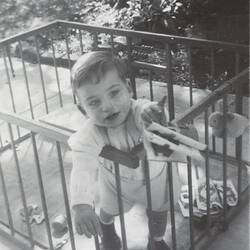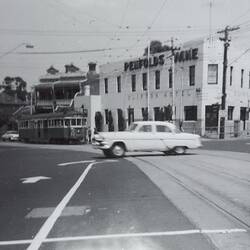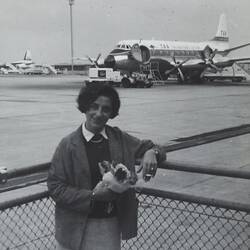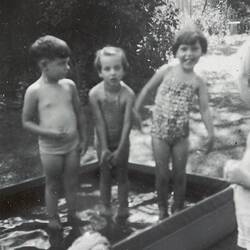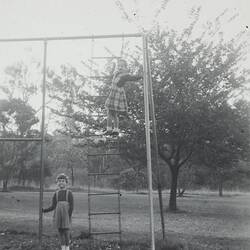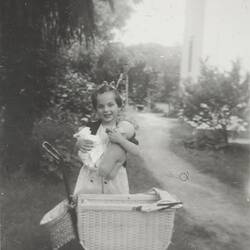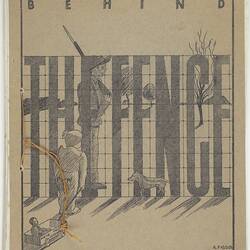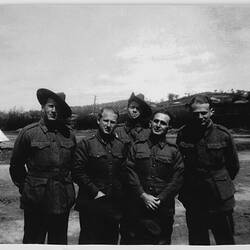Frank Schlesinger was born on 9 July 1912 in Breslau, Germany (now Wroclaw, Poland). His parents Richard and Marie (Mitzi) Charlotte Schlesinger (nee Engel) were both Jewish. Mitzi was born in Vienna in 1910, she was one of three siblings and Richard was one of seven children. Richard worked in the clothing trade, having first partnered with his father, Louis, to establish the first clothing factory in Breslau to use machinery. In 1905 he then began his own highly successful clothing factory called Gebruder Schlesinger.
As a child Frank loved animals, nature, flowers and the countryside. He was interested in sport, playing soccer after school and enjoying tennis, swimming, skiing and was a keen walker. In 1930, aged 18, Frank left school and joined his father's clothing manufacturing business. Frank learnt about its operation and went on trips to buy material. He became a junior partner and salesman for the territory of Germany, touring with wooden trunks. In 1938 his father was forced to sell the business, at a heavily discounted price.
In 1938, the Schlesinger family were caught up in the events of Kristallnacht, when Jews were rounded up and sent to concentration camps. Frank was sent to Buchenwald concentration camp while his parents managed to escape to Brazil to stay with Mitzi's sister Nelly. Frank had had a booking on a ship to Uruguay along with a friend's sister, but he missed the ship because he was in Buchenwald (his sister's friend went on to Montevideo).
However, according to the family, because Frank had this ticket, he was released from Buchenwald on 2 December 1938. He briefly went into hiding in Hamburg, before catching a ship to Thailand (then Siam) where he was assisted by the Jewish community living there. He then moved to Singapore, where he worked as an accountant for a mining company. In Singapore Frank learnt some English and Malay (having already learnt some English at school in Germany). While working for the mining company he spent some time living in a village where there was a tin mine in a swamp, he lived in a bungalow on stilts with no electricity, water or sewerage in monsoonal conditions.
In 1940 the British interned Frank and many other German and Austrian Jewish refugees on an island off Singapore. Although they had all established new lives and careers, their passports stamped with the Nazi emblem meaning they were regarded as 'enemy aliens', and a security risk to the British-held States of Singapore and Malay.
They were sent from Singapore on the 'Queen Mary', which was used as a troop ship during wartime, to Tatura Internment Camp 3, one of the seven WWII Internment Camps established in the Tatura area when war broke out on 3 September 1939. During his time at Tatura Frank was interned at both Camps 3 and 4. As Jewish refugees from Nazism, they were acknowledged as refugees, and were released in 1942. Upon his release Frank, like many Austrian and German Jewish internees, joined the Australian Army 8th.Employment Company. He and other friends picked fruit at Ardmona and shared a tent in Albury and at Camp Pell.
In 1944 Frank met Maria Weiss, and after quitting the army he returned to Melbourne and married Maria on 25 April 1947. They lived above Maria's family business in High Street, Kew and then moved to Princess Street, Kew in 1951. They had two children, Peter and Judy. Frank enjoyed taking the family on caravanning holidays and to the Queensland islands during the 1950s and 1960s. Frank and Maria separated and divorced in 1972.
In 1974 Frank met Ruth and soon after moved into her house in Murrumbeena. He then established a successful business partnership with a family friend until the business failed. He then met Fred Rose, a jeweller, who invited him to sell jewellery in the country, which he did successfully until he retired at age 82.
He remained a fit man, and was described by his daughter as stubborn, caring and generous, who enjoyed company via his friendship club, and fortnightly chess games, which were one of Frank's lifelong passions. Frank's parents had moved from South America to Australia and settled in Brighton Rd, St. Kilda and are both buried in Melbourne General Cemetery, having lived well into their eighties. Frank passed away in April 2007.
More Information
-
Keywords
Internment Camps, Jewish Immigration, Jewish Communities, Immigrant Shipping, Refugees, German Immigration
-
Authors
-
Article types
